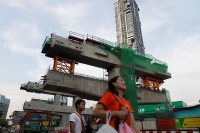Revolutionizing Access Control: How Universities are Embracing Mobile Credentialing Technology
Geoffrey Kohl, the Senior Director of Marketing at the Security Industry Association, discussed the importance of university campuses in testing new technologies in a recent Experts Talk episode. The rapidly…
Unveiling the CASPER Initiative: A Community Health Survey Set to Transform Helena’s Well-Being”.
A new multi-county community health survey is set to take place in June in Helena. Known as the Community Assessment for Public Health Emergency Response (CASPER), this first-of-its-kind initiative is…
Thailand’s Economy Set for Stronger Growth in 2024, But Challenges Ahead
The Bank of Thailand’s April 10 monetary policy meeting revealed that the country’s economy is projected to grow at a faster rate in 2024 compared to 2023, driven by private…
Alleged Insulin Pricing Scheme Leads to Lawsuit against Major Pharmaceutical Companies and PBMs
In the United States District Court for the District of Connecticut, the Connecticut health benefits fund has filed a complaint accusing major insulin manufacturers and pharmacy benefit managers (PBMs) of…
Nationwide’s Annuity Business Thrives Under Eric Henderson’s Leadership: A Retirement Announcement
Eric Henderson, the head of Nationwide’s annuity business, is set to retire at the end of the year after nearly four decades with the company. Henderson has led Nationwide’s annuity…
Blockchain Guru Tannenbaum Appointed New CEO of Figure Technology Solutions Inc. Ahead of Potential IPO
Michael Tannenbaum has been appointed as the new chief executive officer of Figure Technology Solutions Inc. in preparation for the company’s potential initial public offering. Tannenbaum, a former chief operating…
Feasting on Luxury: How Haute Cuisine and Hospitality Have Bounced Back Despite Economic and Geopolitical Crises
The health sector has experienced a 13% increase in turnover, reaching 1,700 million euros in 2019, despite economic and geopolitical crises that have impacted people’s daily lives. According to a…
Boeing’s Commitment to Sustainability: Unveiling a New Research and Technology Center in Nagoya, Japan.
Boeing has recently opened a research and technology center in Nagoya, Japan dedicated to advancing the decarbonization of aviation. The focus of the center will be on areas such as…
Future-Proofing Sports Media: The Sports Content Management Forum Returns to New York City
The Sports Content Management Forum, organized by SVG’s Sports Content Management Advisory Committee and chaired by Anne Graham, Manager of Sports Media Services at Warner Bros. Discovery, is returning to…
Israeli Army Evacuation Warning For Beit Lahia Residents Amid Ongoing Conflict In Gaza
The Israeli Army has issued a warning to residents of Beit Lahia in the Gaza Strip to evacuate and relocate to nearby cities as they prepare for a new military…



